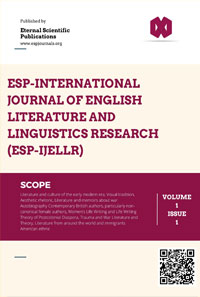ESP International Journal of English Literature and Linguistics Research (ESP-IJELLR)
Citation :
Benjamin, Jonathan, 2025. "Postcolonial and Decolonial Literature: Memory, History, and Rewriting Culture" ESP-International Journal of English Literature and Linguistics Research (ESP- IJELLR) Volume 3, Issue 3: 28-35.
Abstract :
Postcolonial and decolonial literatures emerge as dynamic means of intellectual and cultural resistance to the longue durée effects of colonialism. They are fundamentally political acts of reclamation; they seek to recapture history, retrieve memory and rebuild culture from perspectives imperial power has disavowed. They are not just artistic or historical projects. These literary traditions challenge the hegemony of Eurocentric epistemologies about representation, identity and knowledge. Postcolonial and decolonial writers re-work colonial archives about or received from the colonizer into non-imploding narratives of resistance, survival and resurgence by playing with narrative strategies, hybridity of language, as well as a process of historical-re visioning”.The essay exposes how in their writing postcolonial and decolonial authors tend to rewrite memory, history and culture as interconnected themes. 2.Drawing from the theoretical works of Edward Said, Gayatri Chakravorty Spivak, Homi K. Bhabha, Walter Mignolo and Ngũgĩ wa Thiong’o it argues. It locates literature as a site of cultural healing and epistemic disobedience. What the study shows is that, on the one hand, memory functions as a tool of reconstruction and, on the other, memory functions as an archive of pain which helps to restore agency, language and dignity after centuries of colonial rule.The book explores how mourning and building are inseparable aspects of narratives that aim to recover from colonialism, and they do so by analyzing the works of various authors including Gloria Anzaldúa, Salman Rushdie, Toni Morrison and Chinua Achebe. They bring fresh ideas to cultural continuity rooted in indigenous knowledge systems and collective experience even as they reveal the brutality of historical amnesia. In an effort to redress the imbalance that characterizes the international order of meaning and memory, we argue here that rewriting history through literature is a matter of ethics and politics (beyond aesthetics). Against the myth of Western universality, against the recognition of multiple histories, against entrepreneurial ways forward for epistemic justice to occur, postcolonial and decolonial literatures have been and continue to be acts—the most potent ones—of reworlding. They change our views of the past and re-envision possible futures by rendering culture anew, recovering browned-out memories that have been thwarted.
References :
[1] Achebe, C. (1958). Things Fall Apart. Heinemann.
[2] Adichie, C. N. (2006). Half of a Yellow Sun. Knopf.
[3] Anzaldúa, G. (1987). Borderlands/La Frontera: The New Mestiza. Aunt Lute Books.
[4] Ashcroft, B., Griffiths, G., & Tiffin, H. (1989). The Empire Writes Back. Routledge.
[5] Bhabha, H. K. (1994). The Location of Culture. Routledge.
[6] Fanon, F. (1961). The Wretched of the Earth. Grove Press.
[7] Gilroy, P. (1993). The Black Atlantic: Modernity and Double Consciousness. Harvard University Press.
[8] Hirsch, M. (2008). “The Generation of Postmemory.” Poetics Today, 29(1), 103–128.
[9] Lugones, M. (2008). “The Coloniality of Gender.” Worlds & Knowledges Otherwise, 2(2), 1–17.
[10] Maldonado-Torres, N. (2007). “On the Coloniality of Being.” Cultural Studies, 21(2-3), 240–270.
[11] Mignolo, W. (2011). The Darker Side of Western Modernity. Duke University Press.
[12] Morrison, T. (1987). Beloved. Knopf.
[13] Ngũgĩ wa Thiong’o. (1986). Decolonising the Mind. Heinemann.
[14] Rushdie, S. (1981). Midnight’s Children. Jonathan Cape.
[15] Said, E. W. (1978). Orientalism. Pantheon Books.
[16] Silko, L. M. (1977). Ceremony. Penguin.
[17] Spivak, G. C. (1988). “Can the Subaltern Speak?” In Marxism and the Interpretation of Culture. Macmillan.
[18] Walcott, D. (1992). Omeros. Farrar, Straus and Giroux.
[19] Wright, A. (2006). Carpentaria. Giramondo.
[20] Quijano, A. (2000). “Coloniality of Power, Eurocentrism, and Latin America.” Nepantla, 1(3), 533–580.
[21] Young, R. J. C. (2001). Postcolonialism: An Historical Introduction. Blackwell.
Keywords :
Indigenous Knowledge; Identity; Resistance; Memory; History and Cultural Rewriting, Postcolonial Literature, Decolonial Theory and Hybridity.


 :10.56472/25842773/IJELLR-V3I3P104
:10.56472/25842773/IJELLR-V3I3P104